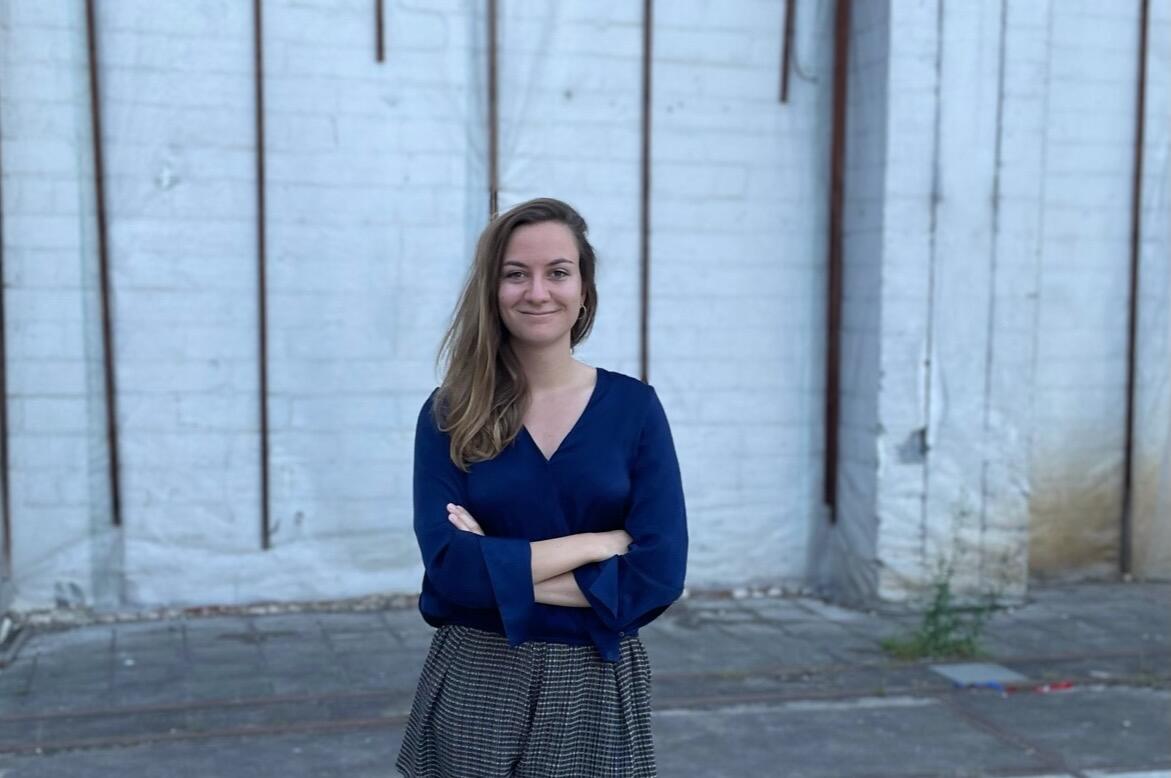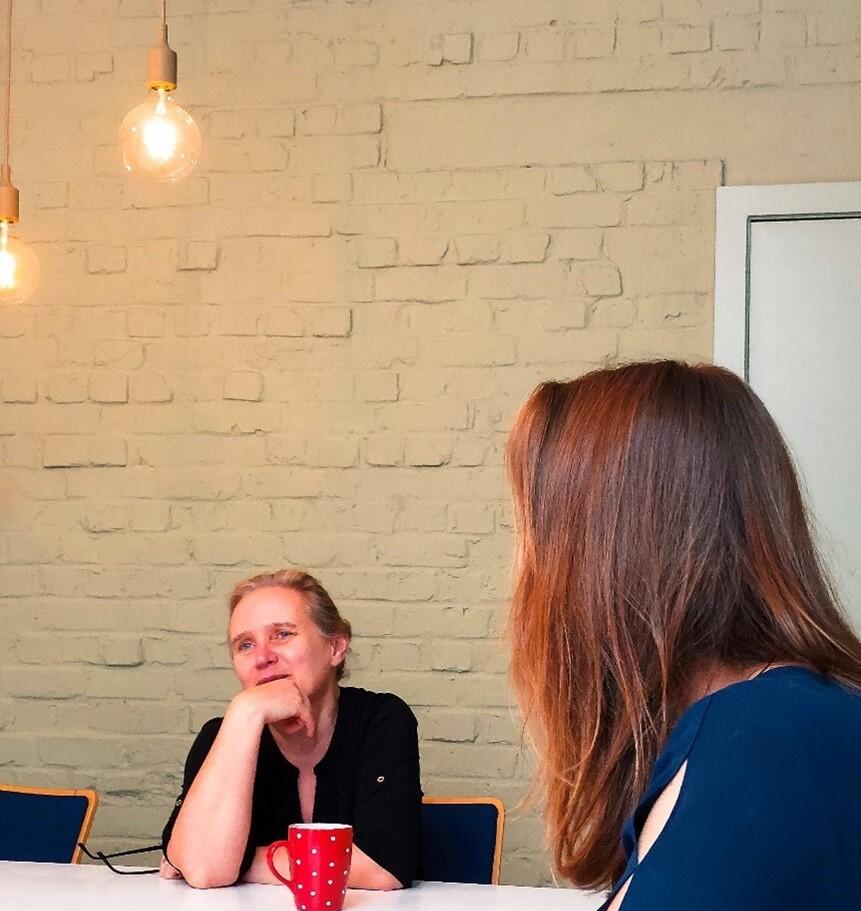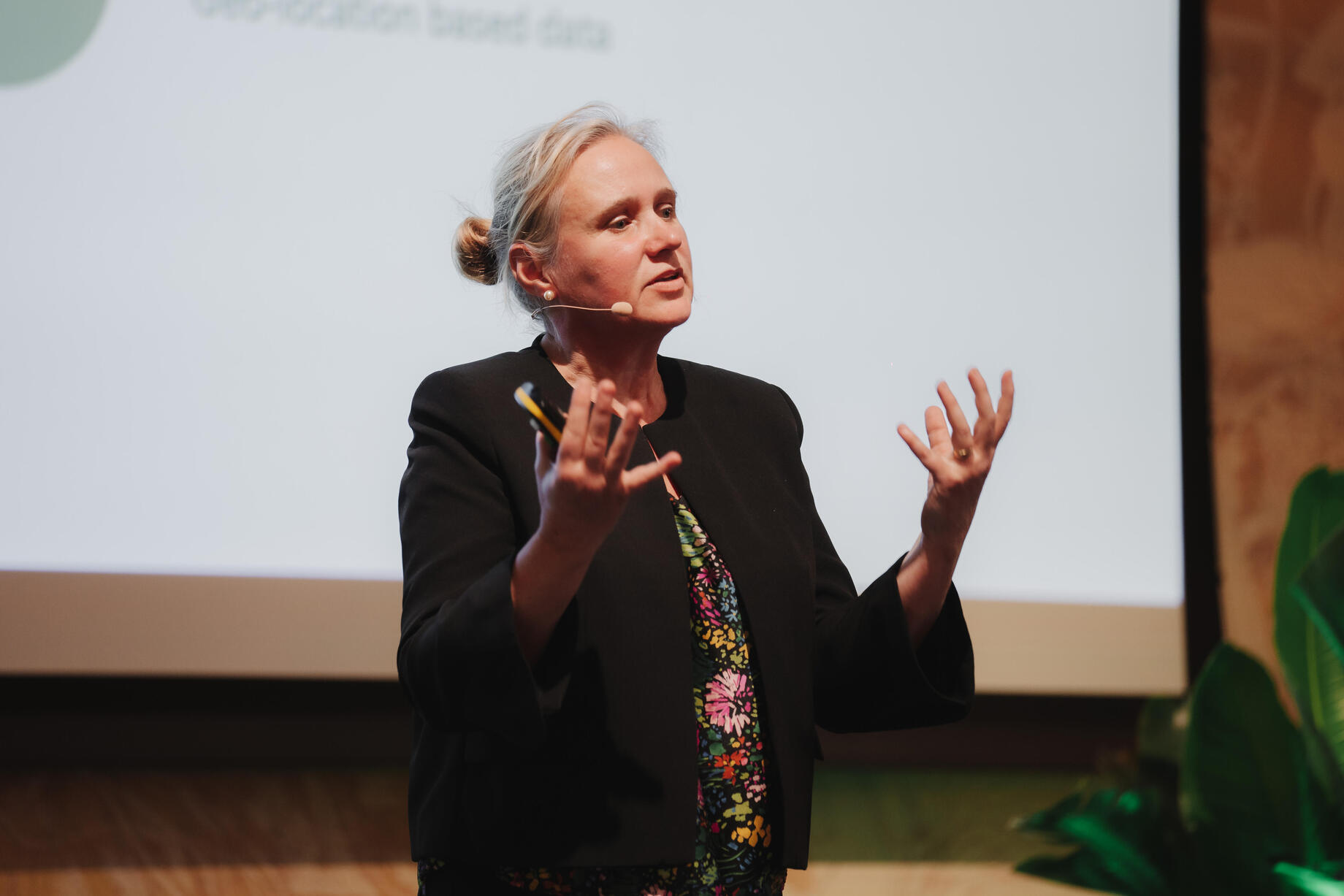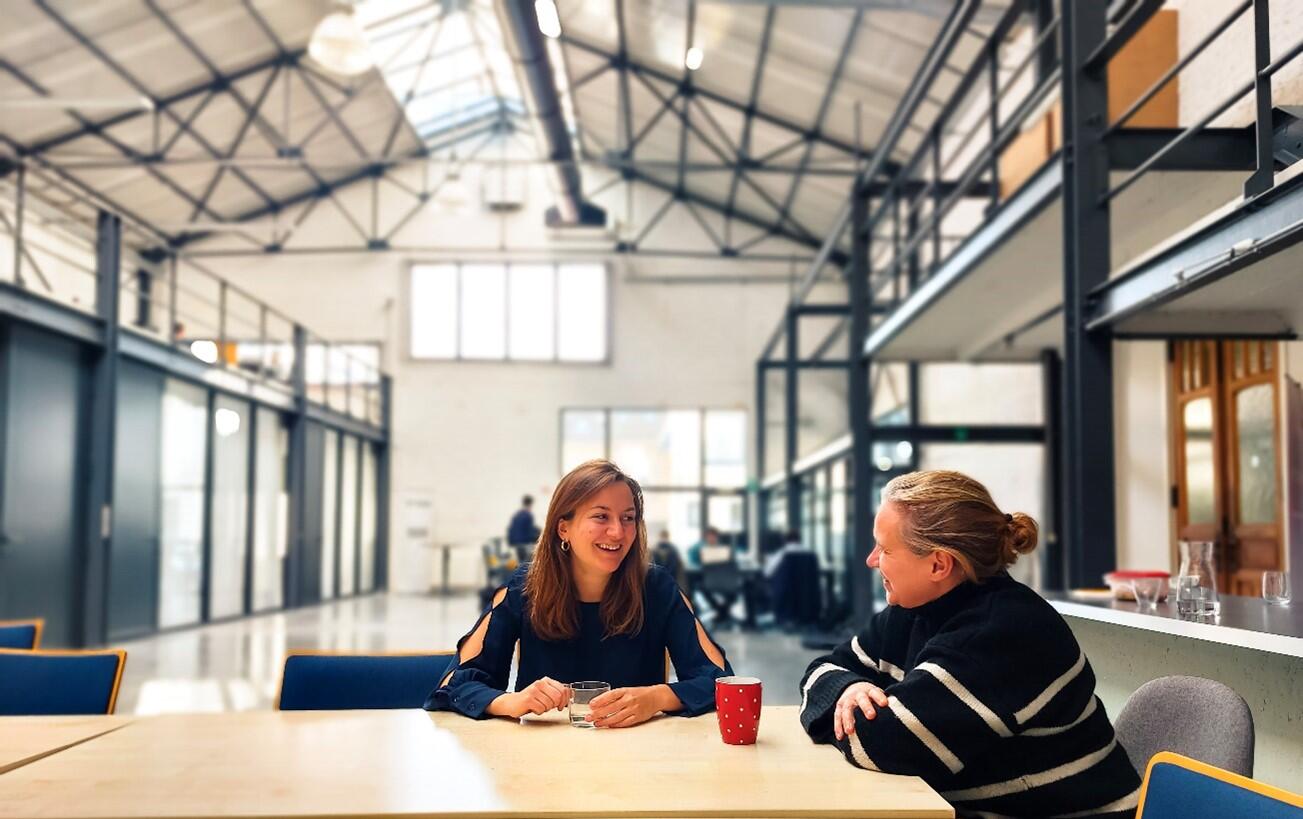Breaking the mirror: women in tech
For International Women's Day 2023, we spoke to two female tech entrepreneurs: Geertrui Mieke De Ketelaere and Charlotte De Vlieghere.
The theme put forward by the United Nations for this year’s International Women's Day is 'DigitALL: Innovation and technology for gender equality'. Why? Because it’s 2023 and women are still underrepresented within tech companies. “We might be wired differently, but we deserve a seat at that table”, says Geertrui Mieke.
Since we, at Invest in Ghent, wanted to know how women experience this first hand, we sat down with two amazing tech-entrepreneurs: Geertrui Mieke De Ketelaere and Charlotte De Vlieghere. The former, “call me Mieke”, calls herself an extroverted nerd and AI translator. She originally started out within the field of deep learning but has focused more on the ethical side of the debate in recent years. The latter describes herself as a data geek and co-founder of Tiro.health. That explains the setting: the bustling office of Home of AI. Indeed, that’s where this company’s found their niche among like-minded souls. The company developed a smart application for medical reporting for doctors, and they’re celebrating their second anniversary in May. They can be found at the intersection between healthtech and digitech in Ghent.
Obstacle course
No worries, we’re not organising a strike. Because that’s what we’re actually commemorating today: the first strike by women in 1908. We want to share experiences. And even though these women are meeting for the first time, an effortless chat ensues. For instance, Mieke is very relieved to hear that Charlotte doesn’t really face any obstacles based on her gender. Charlotte: “I even hear that people are very happy to have a woman at the table. Because, no matter how you look at it, men and women are different. We don’t want to deny that, either. Women bring a unique perspective to the table, and it's this mix that creates a great dynamic. In fact, I feel that our own team benefits from having a diverse perspective.”
-
Sometimes, people ask me if I tackle HR or marketing within the company, the so-called more feminine roles. I like to correct them and say, not entirely without some level of pride, that I write the code to analyse the data.
For Mieke, when she started her career, it was quite different. “But then again, I studied pure robotics and as a woman you’ve got the huge disadvantage of being built differently. We had to weld, mill, drill, and so on. Some machines were so heavy, I just didn’t have enough strength for that.” Next to the physical aspect, the interaction within the corporate world was also different for her. “It’s happened, more than once, that people didn’t want to start an international meeting because they were still waiting for a certain ‘Mike’ to join (laughs). This was before Zoom and Teams. The people at the table were always very embarrassed after I’d explained to them that my name is ‘Mieke’ and that I wasn’t just an assistant taking notes of the meeting. That I could actually help to make decisions as well.”
Charlotte joins in: “I can relate! Sometimes, people ask me whether I tackle HR or marketing within the company, the so-called more feminine roles. I like to correct them and say, not entirely without some level of pride, that I write the code to analyse the data (laughs).”
If these women have learned anything about dealing with potential obstacles, it’s that they need to stand up for themselves. Even if only for those women ready to claim their spot after them. “But I always correct people with a smile,” says Mieke. “It’s just important to call people on it, or they’ll never learn.” “And the next generation thanks you for that!” Charlotte laughs.
-
I’ve learned to stand up for myself. Even if only for those women ready to claim their spot after me.
The common denominator
Both women encounter AI on a daily basis. Many of these prejudices towards women were instilled at the very base of these intelligent systems. You can read about this in Mieke’s book, ‘Human vs Machine’. Data can be used as ingredients to make an algorithm, in the same way you would to bake a cake. If you replace the ingredients, you can make a completely different cake. “The accuracy of that data is crucial,” says Charlotte, “because that’s what makes or breaks your platform. We thought carefully about that from the beginning of our journey. In our app, the doctor always has to validate the data. And the more detailed they do this, the more benefits they get from it themselves. Because that data goes to the GP, counts towards hospital funding and is used in medical research and for other applications.”
Tiro.health of course works with sensitive patient data and has to work on building lasting relationships of trust with their stakeholders, on a daily basis. “But Ghent, and Flanders, is an exciting playground in that respect,” says Charlotte, “where we get to fall and bounce back. The fact that we get to work closely with doctors, who are often international experts in their fields, is unique. It also gives us incredibly valuable feedback and allows us to constantly fine-tune our product and filter out teething problems.” In doing so, they can also count on the support of imec.istart. Still, they may soon make a move on the European market, as they sense that the timing is right. Especially when you see that the US-branch of Apple is betting very hard on that data exchange. “However, before that, we need to grow first, as a company,” Charlotte admits. “So that we have the capacity to improve our offering as well as provide services to entire hospitals.”
Their AI-platform is a textbook example of how intelligent systems can be used in a good way. Charlotte: “I think it’s important to frame that AI is not a stand-alone. We deploy it as a tool to serve people, not the other way around. Let AI take over the repetitive tasks so that employees can engage in the fun aspects of their jobs.” Needless to say, the outcome of these intelligent models should always be validated by humans.
-
People tend to forget why AI was invented in the first place. THE dream was originally – and still is – to copy the human brain by creating systems that can learn on their own.
AI as the big, bad wolf
Recently, AI has been unmissable in the news, with new features from ChatGPT and deepfake videos popping up all the time. You also hear the most fabulous stories, about chatbots developing their own language, for example. “But people tend to forget why AI was invented,” says Mieke. “THE dream was originally – and still is – to copy the human brain, by creating systems that can learn on their own. So, indirectly, these systems could ensure that certain uncertainties are clarified. This is the main reason why I chose to study AI.”
“Compare it to the race to the moon. The dream was to land a rocket on the moon. But the road to that goal gave us so many interesting technological by-products. Just think of the non-stick coating in frying pans and Velcro for sneakers. On the way to the dream of AI, numerous fantastic side products also saw the light of day, such as image and text recognition, for example. But we also called all these products ‘AI’. The problem is that by now we know that the dream of AI is extremely unrealistic. The human brain is extremely difficult to replicate.”
Mieke speaks of a Babylonian confusion of tongues, created because we catalogue those by-products as well as the dream under the same heading of ‘AI’. “Fantastic solutions on one side, but the unattainable dream on the other. Besides, not all the solutions that were built are well received in our society. Just think of fake news, deep fakes, manipulative chatbots, etc. So instead of removing uncertainties, we’re adding to them. And that should never have been the intention of AI.”
People don’t often think about it, but AI has become embedded in many aspects of our lives. Just think of our smartphone’s facial recognition, Spotify’s suggestions or when we type the name of a retail chain into our GPS system and the result is the nearest branch based on our positioning. And this trend will only increase. “It’s therefore important to cultivate a sense of responsibility in this,” says Mieke. “Because one algorithm is validated and used for the next, which will then be used for the next and so on.”
-
I think it’s important to frame that AI is not a stand-alone. We deploy it as a tool to serve people, not the other way around. Let AI take over the repetitive tasks so that employees can engage in the fun aspects of their jobs.
Role models for the next generation of female tech entrepreneurs
How can we pave the way for the next generation? We’ll have to start at school, because we all know that unknown is unloved. “Girls and young women are still too little in touch with didactic STEM material,” says Mieke. “That’s why I’m also committed to Dwengo, a non-profit organisation that sets up didactic projects for teachers, about STEM and AI. For example, they have a Ghent-based programme to recognise which plant needs more water. That way, the link is made through AI to biology and sustainability. And kids are triggered by it as well.”
In addition, Charlotte also finds that, in general and without pigeonholing, women are more curious and dare ta ask more critical questions. According to her, we need to question existing procedures more and not keep doing what we’ve always done, just because ‘that’s the way we’ve always done it’. “That’s why we’re so happy here, in Home of AI. We’re learning a lot from each other because cross-pollination is possible and that’s worth its weight in gold. At lunch, we discuss the most diverse topics. Last week, we talked about how a sailboat can sail faster than the wind speed (laughs). After, we had a discussion about installing multiple Wi-Fi access points at your home. That’s what makes life particularly fascinating, when you take an interest in things that wouldn’t normally be within your ‘domain’.”
And let’s agree on one thing: let’s stop drumming up female tech entrepreneurs to meet certain quotas. “I don’t participate in that,” says Mieke briskly. “Whenever there’s a box to be ticked off to get to that 30%, they just ask a woman to sit on the board. We didn’t go to school, we haven’t sacrificed and fought to be selected solely on the basis of our gender.”
Discover Invest in Ghent
Eager to start a business in Ghent? The team Invest in Ghent is ready to help you start or scale your business in Ghent through our expert local guidance and introduction, so your business can grow even further.



